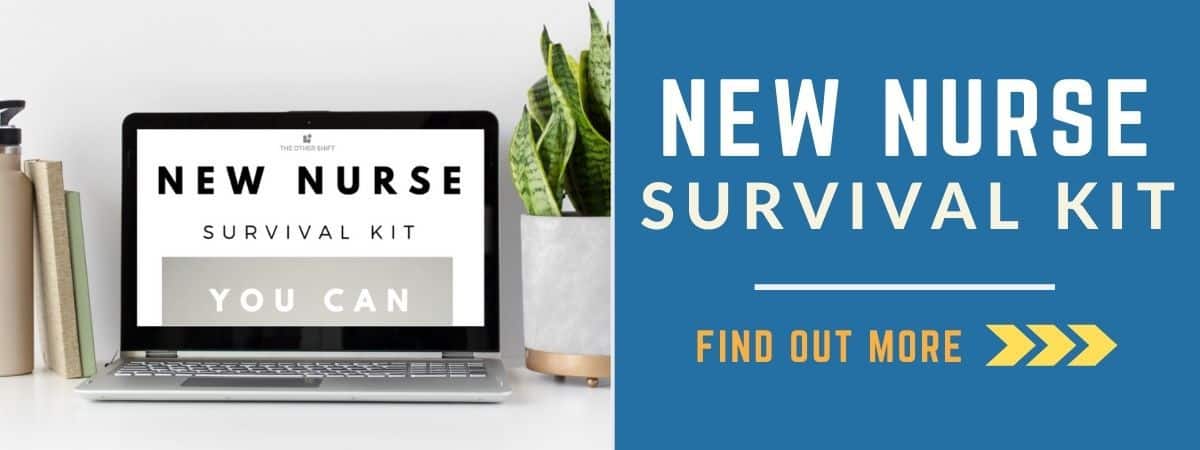Disclosure: This page may contain affiliate links, meaning we receive a commission if you decide to make a purchase through our links, but this is at no additional cost to you. Please read our disclosure and privacy statement for more info.
As a nurse, the word preceptor can mean one of two things; you have a preceptor or you are a preceptor. You should be prepared for both roles at some point in your career because you cannot start any new job without an orientation period and after years of experience, you might find yourself being asked to precept new employees. Both roles come with challenges, but if you know how to approach education, it can be very enjoyable and rewarding personally, whilst being beneficial to your career.
A good nursing preceptor is; an expert in their field, enthusiastic about their job and educating others, a transparent communicator, patient and a great role model. They provide ongoing feedback and formally document discussions at required intervals, aiding in the development of the preceptee.

Ask any nurse and I guarantee they will have at least one story about a preceptor. There is a lot to tell; good, bad, and ugly. To stay on the “good” list, you should know what makes a good nursing preceptor. That’s where we come in – this article will provide you insight from another nurse, a great resource for a new preceptor or someone wanting to provide better assistance with a current preceptee.
What Is a Nurse Preceptor?
The Medical Dictionary for the Health Professions and Nursing defines a preceptor;
As an experienced nurse, physician, or health care professional who guides and teaches those less experienced, including students; mentor
(Stedman, 2012)
Nurse preceptors are valuables assets to a healthcare facility. They provide guidance to new nurses and new employees.
As a new graduate or new employee, you are taking in a lot when entering a new facility for the first time. One of the stressors should not be who is going to be teaching you the ins and outs of the unit.
If you are assigned to a knowledgeable preceptor, your worries will hopefully whither away.
Related: Being a New Nurse is Hard. How to Stop Feeling Incompetent

What Makes A Good Nurse Preceptor?
In my opinion, good preceptors have a lot of experience – as a nurse and as a nurse on the unit they work on. They should be considered experts in their field. They should have a desire to teach and are enthusiastic about it. They are prepared for the job and know the patient population well. They are excellent communicators and give feedback often.
The preceptor can answer most, if not all, questions asked of the new nurse and clarify things that may be confusing. Being able to teach and work at the same time is an essential quality because you are still needing to take care of patients.
Good preceptors are organized, pay close attention to detail, and have good time management skills. Most important of all, the preceptor should show a passion for their job and be an effective role model.
It takes a lot of time, knowledge, and effort to become the best preceptor. Not everyone is qualified and, unfortunately, not everyone likes to be assigned to this role.
With the ongoing nursing shortage and high turnover rates in healthcare, it is inevitable that you will find yourself being asked to be a preceptor if you have experience. Being educated and prepared will get you very far.
Related post: Building Confidence As A New Nurse. Steps To Success

What Does A Nurse Preceptor Do?
The nurse preceptor should be using evidence based practices to help new registered nurses (RN) or RN’s new to the unit. They will be the one who takes education (what they know) and links it to nursing practice (what they do).
The preceptor should be competent in several areas in order to fulfil their role in the following ways:
- Be a good teacher. You are responsible for the new RNs learning needs. School taught them how to be a nurse, but you need to teach them how to ACTUALLY BE a nurse or how to be a nurse on that specific unit.
- Be a leader. We’ve all been there or seen it, the new RN running behind their preceptor like a lost puppy. The new RN may be scared – scared of making a mistake, scared of getting lost, or scared of being a nurse altogether. The preceptor should be available for all their needs to set them up for success.
- Be good at evaluating. The nurse preceptor is the voice for management whether or not the new employee is understanding their new role. Preceptors are generally given a checklist or orientation plan to follow and determine if skills are adequate to work on that unit. Evaluating should be an ongoing process over the course of the orientation.
- Be a role model. The preceptor will always be someone new nurses can look up to. They should demonstrate good work ethic and be a resource for the unit. How they teach new nurses reflects on them as employees to that facility.
Depending on how long the orientation is, the preceptor will have a timeline to follow.
At the beginning of the orientation, the preceptor will need to introduce themselves and give a little background on their career. This first introduction is important to gain the trust of the new RN and create a good working relationship right away.
By using their impeccable organization skills, they will help the new nurse get their orientation schedule written down and make sure any meetings are penciled in. The preceptor should give the new nurse a tour of the unit and / or hospital and introduce them to other employees.
The preceptor should be creating a safe zone for the preceptee to come with any questions, concerns or frustrations.
Over the course of the orientation, the preceptor will continually check off goals of learning or competencies. They will meet with the manager every so often to discuss the goals and evaluate if the new RN has met them or needs more time. These meetings should be constructive and involve the preceptee.
Good and open communication is key. The new RN should not only be evaluated in meetings, but should be receiving feedback on a daily basis. Learning how to provide constructive feedback and evaluate your preceptee is an extremely important factor in determining how the new employee will succeed on the unit.
Discussed below are tips on how to do both.

Preceptors: How To Provide Constructive Feedback
1. Provide feedback in a private place
Constructive feedback should always be discussed in private.
Depending on the individual, some new nurses are very sensitive and may not have had to deal with critiques on their performance prior to this job.
It’s not always positive, which if the new RN has never had this type of feedback before, might cause their emotions to react in ways which might not be common for them. Respect the potential sensitivity of the preceptee and make sure they feel comfortable under this circumstance.
2. Be clear about the topic and make it very specific
Let the preceptee know exactly what the feedback is going to be about and talk about exactly what they did. Be factual and do not use your opinion or the opinions of others. This will assist in fixing the behavior or help them understand what should be done differently.
3. Give them a chance to explain
There’s an old saying “there’s more than one way to skin a cat.” Well, let the RN explain why they did what they did and maybe it will make more sense to you. Getting their side of the story or hearing their thought process will allow you to better help them learn, whilst also opening your eyes to something you may not have considered.
This is also a way for you to understand the best way they learn – a key ingredient, as us humans are not robots and one size doesn’t fit all in this regard.
4. Have resources readily available
If they did something against protocol, have the policy printed out or pulled up on the computer to show them exactly what it says. If you are critiquing them on a PICC line dressing change they did, have the policy on a PICC line dressing change so they can use it for reference and do it right the next time.
5. Avoid using words that sound like you’re placing blame
It is hard enough to learn how to do a ton of new skills, but if you mess up and feel like you are getting blamed, it could lead to the RN feeling defeated when they are just getting started.
Instead of saying “You didn’t cap the needle before you threw it in the sharps container”, you can say something like “Great job getting that lab draw on the first try, but it’s a good idea to remember to cap your needle before you throw it in the sharps container”.
The sandwich feedback method is very much welcomed for people in today’s age and better results are typically seen, versus bluntly telling someone they aren’t up to scratch!
6. Talk about what is expected of them in the future
State clearly what expectations are within your unit or organization. Again, you can print out policies, as visuals are always good to have as a reference.
Stress that should they meet these expectations, it can bode extremely well for their future career progression.
7. Put everything in writing
Having documentation of what was discussed is important for a number of reasons. It can help identify things that are repeatedly missed “You forgot to cap the needle three other times”, to then figure out a better way to teach them “What can we do to help you help you remember.”
This could also be important if the employee is not performing up to unit standards and management needs to get involved.
8. Always ask them what they need
We feel it’s important to finish with this point.
This is a team effort. Making sure to give the preceptee the floor and allow them to share their needs is equally important. Allowing them to have buy in to the process will lead to greater adoption of feedback and make them view you in a much more inclusive light.
Wanting to give shift work related advice? Check out this post – How Do Nurses Not Get Sick? 10 Tips To Staying Healthy
[VIDEO] – Helpful video specifically for nurses new to ER
Evaluation Tools For Preceptors
Each facility differs on how they want a preceptor to evaluate the new RN. Some use rating scales or score cards. Some have a list of questions to be answered in essay form. However the evaluation form is set up, the most important things for a preceptor to do when documenting their evaluations are the following:
- provide clear descriptions with detailed feedback
- be objective
- be honest
- make sure all information is filled in completely and dated
As you might not have a tool in place currently for your workplace, we wanted to provide some examples of evaluation tools for you. These can definitely be replicated to suit your own organisations needs and requirements.
Scorecard

Rating Scale

Essay Review


Other nursing posts from theothershift.com
- Am I Too Old to Become a Nurse? 7 Tips for Joining After 40
- Disadvantages of Travel Nursing: How to Avoid The Icky Traps
- New Nurses: How to Stop Feeling Like An Idiot
In Summary: What Makes A Good Nursing Preceptor?
Humans are inquisitive by nature. We want to learn and grow, whether it be in our personal interests or within the workplace. Having a formal position in place that allows a more senior educator to provide feedback to younger or new employees is a great initiative hospitals have taken. Not all workers have such a luxury.
So if you’ve been granted the role of preceptor, take pride in knowing that someone within your organization believes you have the knowledge to share, whilst trying to perform that role to the best of your ability so that when your new RN looks back in 20 years time, they are extremely thankful for you sharing insights to the role that no textbook was ever going to assist them with!
In case you missed it, click here for our New Nurse Survival Kit. Also, if you need a new pair of shoes to stop the aches and pains after a 12-hour shift, this post will be very helpful!

Disclosure: This page may contain affiliate links, meaning we receive a commission if you decide to make a purchase through our links, but this is at no additional cost to you. Please read our disclosure and privacy statement for more info.
Recent Posts
An examination of the night shift professions, that while sometimes underappreciated, are necessary for civilization, in its current form, to exist. A city can be thought of as a machine. Each...
Culminated from an exhaustive yet well-funded journey into the night, this article will prepare you for life outside of work while being a denizen of the dark. During days off, night shift...



